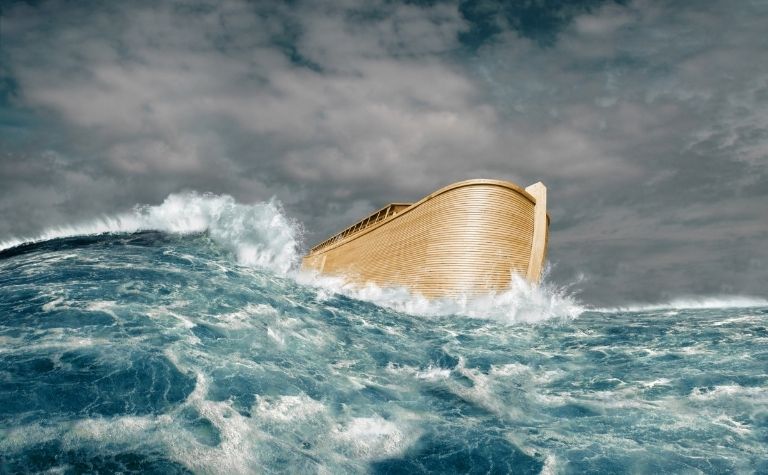The story of Noah, the flood, and the ark is one of the most iconic narratives in the Bible. Not only does the magnitude of the floodwaters leave readers awe-struck, but so does the faith that Noah has amid a godless generation. Readers of Genesis often have many questions about the flood story, one of which is how long it took for Noah to build the ark.
According to Genesis scholars who have commented on the duration of the ark’s construction, it took Noah about a century to build. Some think he spent a lot of time preparing the ark’s materials before he erected the vessel. Yet one prominent scholar argues that it took Noah weeks to build, not years.
What does the reference to 120 years in Genesis 6:3 signify, and how does it help answer the question? What is the evidence that the ark took decades, years, months, or weeks to build? What is the challenge of taking decades to build an ark made of wood? Keep reading to learn the answers to these questions and others.
Also see How Old Was Noah When He Built the Ark? to learn more.

God decides to destroy the world with a flood
The story of Noah, the flood, and the ark (Gen. 6-9) is one of the most precisely-dated events in the Bible. However, the text doesn’t note every day and month in the story. Most of the dates, often made in reference to Noah’s age, concern the duration of the floodwaters and key moments regarding the event.
Genesis doesn’t explicitly mention the time it took Noah to build the ark. Neither does the rest of the Bible. Yet, some scholars believe readers can infer a probable scope of time from a verse appearing early in the story. Others, however, are less confident that the text makes such an implication.
God declares consequences for rebellious humanity
The first eight verses of the flood story (Gen. 6:1-8) illustrate how bad the wickedness on the earth had become in the days of Noah. As a result of the violence and immorality, God declared that he would withdraw his spirit from the people he made.
| Translation | Genesis 6:3 |
|---|---|
| ESV | “My Spirit shall not abide in man forever, for he is flesh: his days shall be 120 years.” |
| KJV | “My spirit shall not always strive with man, for that he also is flesh: yet his days shall be an hundred and twenty years.” |
| NASB | “My Spirit shall not strive with man forever, because he also is flesh; nevertheless his days shall be one hundred and twenty years.” |
| NIV | “My Spirit will not contend with humans forever, for they are mortal; their days will be a hundred and twenty years.” |
| NLT | “My Spirit will not put up with humans for such a long time, for they are only mortal flesh. In the future, their normal lifespan will be no more than 120 years.” |
Is 120 years a reference to people’s lifespan? According to the genealogy found in Genesis chapter five, people before the flood commonly lived for several centuries; some even lived longer than 900 years (e.g. 5:27). In light of this, some think Genesis 6:3 teaches that God shortened people’s lifespans as a punishment for their sin.
However, many scholars believe this interpretation is incorrect, partly because people continued to live longer than that. For example, Noah lived 950 years, Shem lived 600, Abraham lived 175, Isaac lived 180, and Jacob lived 147. Furthermore, some verses indicate that the typical lifespan is about 70 years (cf. Psa. 90:10). The counterargument is that 120 signifies a gradual reduction in age, not an immediate one.
Is 120 years a reference to the time before the flood? Unlike the NLT translation (see above), other Genesis scholars believe 120 years describes how long it would be until God destroyed the world with a flood (Gen. 6:17). In this case, the people referred to in the verse are those who were alive at the time of the flood, not humanity in general.
Later in the passage, when God says, “I have determined to make an end of all flesh” (Gen. 6:13), he is only referring to Noah’s generation, not all people who would ever live on earth. This may suggest that the people mentioned in Genesis 6:3 are only those living in Noah’s day.
Also see How Long Did Noah Live? to learn more.

Did the ark take decades, years, months, or weeks to build?
The time between when God sentenced the world to destruction and the flood starting was 120 years, which may provide readers with a general timeframe for the ark’s construction. However, the text doesn’t date the statements of when God told Noah that a flood was coming (Gen. 6:17) and his subsequent obedience (Gen. 6:22).
One Genesis scholar writes, “We are not told exactly when God’s instructions to Noah were given, though it was obviously sometime after (probably soon after) His prophetic warning that man would have only 120 more years before judgment would come (Genesis 6:3). The work probably was going on throughout most of the century immediately preceding the Flood. [1]
The challenge of preserving the wood
One challenge of taking a century or more to build the ark is constructing one part of the wooden vessel several decades after a different part. The aging and deterioration of certain parts of the ark would be drastically different than other sections.
One scholar writes that 120 years is “a long time to build a boat; too long, in fact. At that pace, Noah would still be chipping away at the stern while the bow had been exposed to the weather for a century. It makes more sense that Noah spent a lot of this time in preparation until, with everything prepared, he organized a serious barn-raising.”
He continues, “The pitch for Noah’s ark was probably not bitumen but the gum-based resins extracted from certain trees (such as pitch pine). Wooden ships were routinely waterproofed this way. The difference is that God directed Noah to apply the icky goo inside as well as out,” which acted as a preservative.”
“This is ideal for a larger-than-average wooden ship that takes a decade or more to assemble, not just the typical year or so.” [2]
Also see How Many Animals Were On the Ark? to learn more.

Could the ark have taken 40 days to build?
Umberto Cassuto (1883-1951) was a Jewish rabbi and Hebrew scholar whose work on Genesis is still widely read in the world of biblical research.
In attempting to date the events mentioned in the flood story, Cassuto theorizes that the author of Genesis forgot to mention that it took 40 days to build the ark or that a later editor of the text omitted the reference. [3]
His suggestion isn’t based on a particular verse in the flood story; instead, it’s an argument from silence. His theory is based on Genesis’ teaching that Noah was 600 years old when the flood started (Gen. 6:6), yet the waters didn’t burst forth from the ground and sky until 47 days later (Gen. 6:11).
According to Cassuto, Noah took 40 days to build the ark, which was followed by a seven-day pause. “And after seven days the waters of the flood came upon the earth” (Gen. 7:10).
Does 1 Peter 3:20 argue against Cassuto’s theory? Peter teaches that God patiently waited for Noah to complete the ark’s construction. With regard to the demonic spirits active in Noah’s day, Peter writes that “they formerly did not obey, when God’s patience waited in the days of Noah, while the ark was being prepared, in which a few, that is, eight persons, were brought safely through water” (1 Pet. 3:20).
The Greek word translated “patience,” which is how all major English translations render it, comes from the makrothumia (μακροθυμία), and literally means longsuffering. Longsuffering is commonly defined as having or showing patience in spite of troubles, especially those caused by other people.
Some would argue that God’s patience fits a century or more of waiting, as opposed to five or six weeks.
The timeline of the flood according to Genesis
The table below reflects the parts of the flood story that have a firm date in the text.
| References | Year, Month, Day | |
|---|---|---|
| God announces the flood | 7:4 | 600, 2, 10 |
| The flood starts | 7:11 | 600, 2, 17 |
| Last 40 days | 7:12 | 600, 3, 27 |
| The waters recede | 8:4 | 600, 7, 17 |
| The mountain peaks appear | 8:5 | 600, 10, 1 |
| Noah sends the raven | 8:6 | 600, 11, 10 |
| Noah sends the dove for a 2nd time | 8:10 | 600, 11, 24 |
| Noah sends the dove for a 3rd time | 8:12 | 600, 12, 1 |
| The flood waters dry up | 8:13 | 601, 1, 1 |
| Noah exits the ark | 8:14 | 601, 2, 27 |
Also see How Big Was Noah’s Ark? to learn more.
References:
[1] The Genesis Record by Henry Morris. p. 183.
[2] The New Answers Book 4. p. 221-222.
[3] As discussed in The Book of Genesis: Chapters 1-17 by Victor Hamilton. p. 179.
Related Articles
Noah is an iconic figure in the Bible who is known for his righteousness and faith. After God decided to destroy the world with a flood because of how sinful humanity had become, he called Noah to...
Noah stands out to Bible readers because of the flood story. Yet, he first stood out to God because of his righteousness (Gen. 6:9). The New Testament mentions Noah, along with Abraham, Moses, and...
